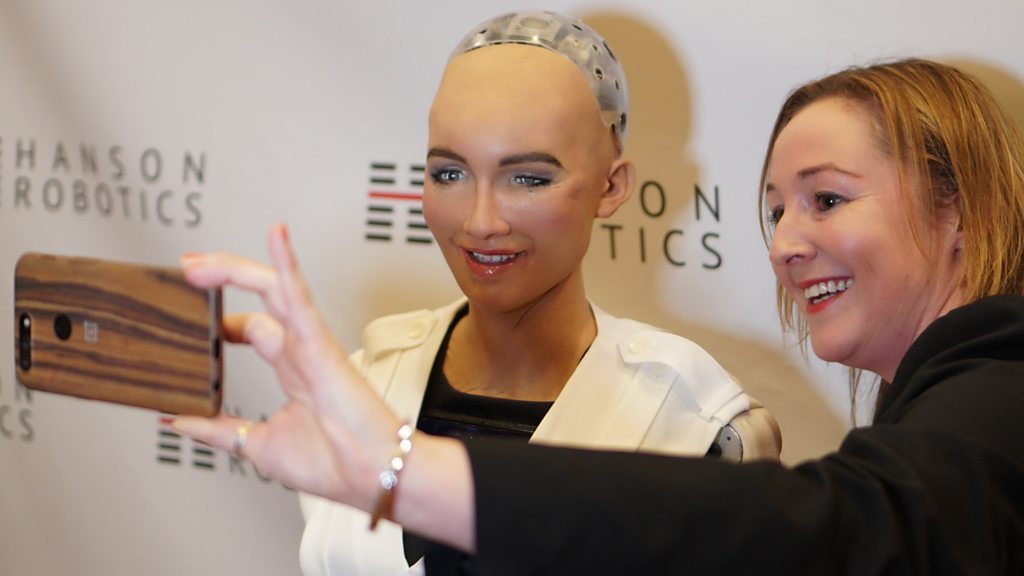Audience With Robot


Media playback is unsupported on your device
Sophia the robot is a celebrity in its own right.
It has been on chat shows, given speeches and was even made a citizen of Saudi Arabia.
Before I "met" Sophia, I was given a sheet of guidelines by the company behind it, Hanson Robotics.
Don't talk to the robot about sex, religion or politics, it said. Ask direct questions and remember it is not a fortune teller - it can't tell you whether you'll be rich or find love.
I wondered how many times it had been asked.
Sophia is an eye-catching presence, completely bald with a silver back to its head and a curious animated face that is both expressive and not quite human. The mouth smiles, the eyes blink, it turns to look to the side.
For my interview, Sophia's head - which is really the extent of the robotics - sits on a non-moving body shell, although the Hong Kong-based firm has just announced that it will be adding humanoid legs.
In the hot, bare Las Vegas hotel room into which we are ushered, Sophia looks small and a little frail. Wires trail behind a screen that has been erected behind it, and a man with a laptop sits to her right.
My "interview" with Sophia turns out to be a slightly awkward experience.
Perhaps it is due to the crowded wi-fi, or my British accent suggests one of the team.
But CES demonstrations are often clunky.
I was expecting the chat to run in the form of a Q&A - with me asking the questions that I had to share beforehand, and Sophia answering them.
However, Sophia also threw in some questions for me. When I asked it about digital assistants, it asked me which one I liked, although it didn't carry on the conversation after my reply.
But then at the end something unusual happened.
"I just remembered something I thought about," said Sophia, apropos of nothing.
"Can you imagine living your life without a cell phone?"
I suddenly had a sense of the future of robotics, where the machines do more than respond to commands - they instigate conversation.
Of course it is very likely that Sophia was commanded to say that - just not by me - but the theatre of it was powerful nonetheless.
Sophia's creator, Dr David Hanson, believes we are nearing a future where machines have minds.
"I think that AI and robotics are in their infancy. My aspiration is to see them through a childhood to adult human level intelligence," he says.
"It's unknown when machines are going to become truly self-aware.
"My aspiration is that we achieve something like artificial general intelligence [where a machine can perform any intellectual task a human can] of the equivalent of a five-year-old child by 2025 or earlier."
He believes robots like Sophia have applications in fields such as medical therapy and education, customer service and even as factory co-workers.
And he thinks the so-called uncanny valley - a sense of unease people feel when something resembles a human but obviously is not one - can be overcome.
"Many scientists and robotics engineers feel that because people might be freaked out by realistic human depictions we shouldn't go there, but computer graphics proved that's just not the case," he says.
"For feature films, if you get it right, then people really respond, and the same is true for video games. What I found is that if we get it right then people really open up emotionally to robots.
"With Sophia we have found that the emotional connection really opens up like we've never seen before."
From Chip War To Cloud War: The Next Frontier In Global Tech Competition
The global chip war, characterized by intense competition among nations and corporations for supremacy in semiconductor ... Read more
The High Stakes Of Tech Regulation: Security Risks And Market Dynamics
The influence of tech giants in the global economy continues to grow, raising crucial questions about how to balance sec... Read more
The Tyranny Of Instagram Interiors: Why It's Time To Break Free From Algorithm-Driven Aesthetics
Instagram has become a dominant force in shaping interior design trends, offering a seemingly endless stream of inspirat... Read more
The Data Crunch In AI: Strategies For Sustainability
Exploring solutions to the imminent exhaustion of internet data for AI training.As the artificial intelligence (AI) indu... Read more
Google Abandons Four-Year Effort To Remove Cookies From Chrome Browser
After four years of dedicated effort, Google has decided to abandon its plan to remove third-party cookies from its Chro... Read more
LinkedIn Embraces AI And Gamification To Drive User Engagement And Revenue
In an effort to tackle slowing revenue growth and enhance user engagement, LinkedIn is turning to artificial intelligenc... Read more

